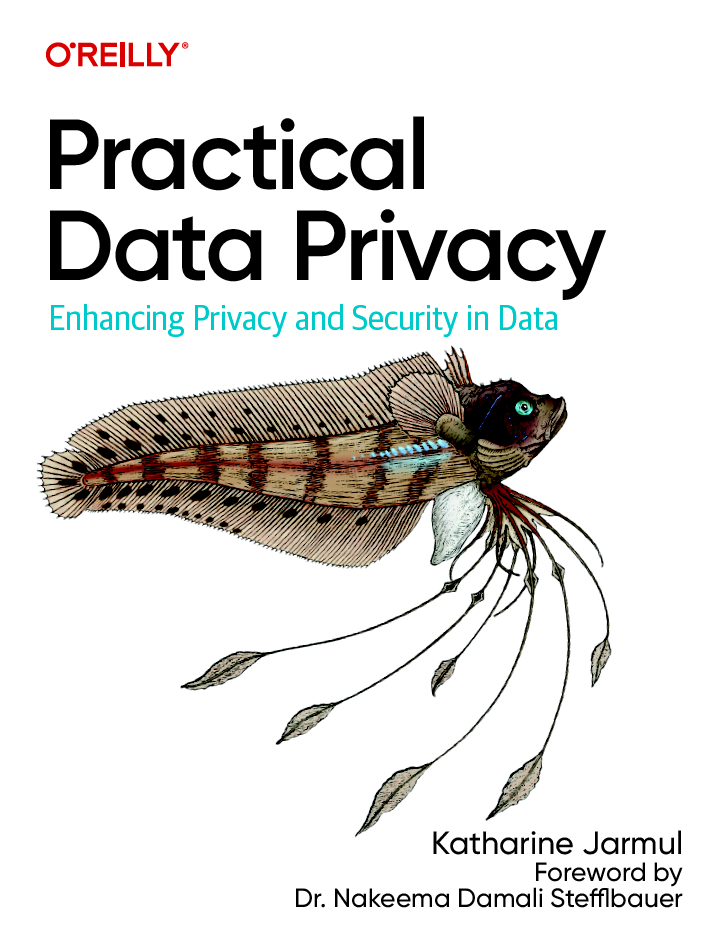PROBABLY PRIVATE
Issue # 5: Upcoming O'Reilly Book and Building a Privacy-First Newsletter




Hello Privateers!
It's been awhile -- and I imagine the time in between these newsletter has brought a lot of change to your life as well. There's been a year of war here in Europe, a devastating earthquake in Turkey, Kurdistan and Syria, rising inflation everywhere and, more recently, layoffs and financial troubles in the technology sector. That's a lot!
There's also been amazing stories of joy, human resilience, resistance and justice. Even John Oliver started talking about ethical AI! Iranian women and allies continue their fights for regime change and reform. Ex-Twitter employees are filing class action lawsuits. With every change there is a response.
I have some exciting news of what I've been up to for the past year or so in this edition, that I'm very happy to share with you.

In Winter 2022 I got an email from O'Reilly, asking if I would be open to writing a book on Practical Data Privacy. They noticed an uptick in interest, as I had already run several live trainings on the topic, they reached out.
At the time I was trying to sort out what to do after my exit from Cape Privacy, unsure of where exactly I would land and what I wanted to prioritize. One thing was clear, I wanted to write this book.
When I first started exploring privacy in data science and machine learning, many of my peers wondered why it interested me, as they saw it as "not a problem for us to solve". As I dove into the field, I realized that the technical aspects of privacy were not only interesting, they also had quite a bit to do with other areas of data science, data engineering and machine learning.
The learning curve then was quite steep. There wasn't degrees or even much material on what we now call privacy engineering. Most of the introductory texts you could find were focused on "Data Administration" or "Governance Technologies". The other texts were on ArXiv (or even behind locked walls), and were dense, written for those already quite familiar with the algorithms and methods.
With many mentors along the way, I was able to learn how privacy technologies fit into our work as data people. I also had a chance to vision, build and develop some exciting new privacy technologies, like Cape's amazing work in encrypted machine learning and what the research team there was able to prove possible with the release of Moose, a library for encrypted data science.
I wrote this book so that others don't need the same sharp learning curve. It is a practical guide on privacy technology for data scientists and technologists. It covers exciting technologies like federated learning, encrypted computation, differential privacy and how to integrate these into your work. It gives you grounding in theory, and Jupyter Notebooks and code to guide hands-on learning. It touches on related problems, like risk analysis, data security, reading privacy regulations, working across organizational units on privacy and building a culture of experimentation.
If it can help one person to make an easier transition into this field, I'll call it a success! You can pre-order it via your favorite bookseller or even call your local bookstore to order a copy. If you use Amazon, you can pre-order it on Amazon, and read the advance reviews.
Besides writing a book, another reason why it took me so long to get this newsletter out is that I went through a many month journey to find a privacy-first way to deliver this to your Inbox.
On this journey, I found out just how non-private most email is, with most email tracking turned on by default with little ways to turn it off. In a lot of ways, this makes sense for how many people use newsletters, and how companies avoid spamming people; but privacy doesn't have to be a zero-sum game (see Ann Cavoukian's 4th Principle in Privacy by Design: Full functionality – positive-sum, not zero-sum).
I wrote about building a privacy-first newsletter on my blog, detailing how I finally ended up where I am at now: a self-hosted site, self-produced list functionality, with email provided by Runbox. The site designs took some time and are now fully compatible with many email clients thanks in a big part to Žan's help.If you have questions, thoughts or even know of a privacy-first SMTP relay service, I'd be very excited to hear from you!
In any case, now that the migration is done and the site is up and running (and very pink !), you'll be hearing from me more often. 🎉
If you have any questions, want to talk about the book content, or just say hello, please hit reply. I'd love to hear from you. 😊
 With Love and Privacy, kjam
With Love and Privacy, kjam